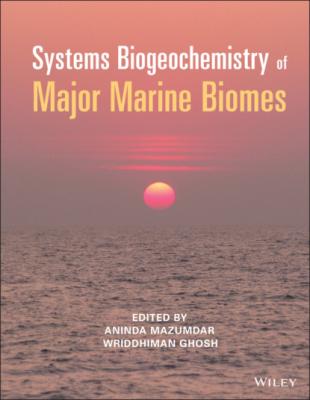Systems Biogeochemistry of Major Marine Biomes. Группа авторов
Чтение книги онлайн.
Читать онлайн книгу Systems Biogeochemistry of Major Marine Biomes - Группа авторов страница 42
 and Environmental Microbiology 73 (21): 7003–7012. doi:10.1128/AEM.01087–07
and Environmental Microbiology 73 (21): 7003–7012. doi:10.1128/AEM.01087–079 Breuer, M., Rosso, K.M., Blumberger, J. et al. (2015). Multi‐haem cytochromes in Shewanella oneidensis MR‐1: structures, functions and opportunities. Journal of the Royal Society Interface 12 (102): 20141117. https://doi:10.1098/rsif.2014.1117
10 Bhushan, B., Halasz, A., Thiboutot, S. et al. (2004). Chemotaxis‐mediated biodegradation of cyclic nitramine explosives RDX, HMX and CL‐20 by Clostridium sp. EDB2. Biochemical and Biophysical Research Communications 316 (3): 816–821.
11 Bhushan, B., Halasz, A. and Hawari, J. (2006). Effect of iron (III), humic acids and anthraquinone‐2, 6‐disulfonate on biodegradation of cyclic nitramines by Clostridium sp. EDB2. Journal of Applied Microbiology 100 (3): 555–563. https://doi.org/10.1016/j.bbrc.2004.02.120
12 Bjerg, J.T., Boschker, H.T.S., Larsen, S. et al. (2018). Long‐distance electron transport in individual, living cable bacteria. Proceedings of the National Academy Of Sciences 115 (22): 5786–5791. https://doi.org/10.1073/pnas.1800367115
13 Bowman, J.P., McCammon, S.A., Nichols, D.S. et al. (1997). Shewanella gelidimarina sp. nov. and Shewanella frigidimarina sp. nov., novel Antarctic species with the ability to produce eicosapentaenoic acid (20: 5𝜔3) and grow anaerobically by dissimilatory Fe(III) reduction. Microbiology 47 (4): 1040–1047. https://doi.org/10.1099/00207713‐47‐4‐1040
14 Bozal, N., Montes, M.J., Tudela, E. et al. (2002). Shewanella frigidimarina and Shewanella livingstonensis sp. nov. isolated from Antarctic coastal areas. International Journal of Systematic and Evolutionary Microbiology 52 (1): 195–205. https://doi.org/10.1099/00207713–52–1‐195
15 Braud, A., Hannauer, M., Mislin, G.L.A. et al. (2009). The Pseudomonas aeruginosa pyochelin‐iron uptake pathway and its metal specificity. Journal of Bacteriology 191 (11): 3517–3525. doi:10.1128/JB.00010–09
16 Burns, J.L. (2010). Molecular mechanisms of microbial iron respiration by Shewanella oneidensis MR–1. PhD Thesis. Georgia Institute of Technology.
17 Caccavo, F., Jr., Lonergan, D.J., Lovley, D.R. et al. (1994). Geobacter sulfurreducens sp. nov., a hydrogen‐and acetate‐oxidizing dissimilatory metal‐reducing microorganism. Applied and Environmental Microbiology 60 (10): 3752–3759.
18 Call, D.F. and Logan, B.E. (2011). Lactate oxidation coupled to iron or electrode reduction by Geobacter sulfurreducens PCA. Applied and Environmental Microbiology 77 (24): 8791–8794. doi:10.1128/AEM.06434–11
19 Calvert, S.E. and Karlin, R.E. (1991).Relationships between sulphur, organic carbon and ironin the modern sediments of the Black Sea. Geochimica et Cosmochimica Acta 55 (9): 2483–2490. https://doi.org/10.1016/0016–7037(91)90367‐E
20 Canfield, D.E. (1989). Reactive iron in marine sediments. Geochimica et Cosmochimica Acta 53: 619–632. https://doi.org/10.1016/0016–7037(89)90005–7
21 Canfield, D.E., Thamdrup, B. and Hansen, J.W. (1993). The anaerobic degradation of organic matter in Danish coastal sediments: iron reduction, manganese reduction and sulfate reduction. Geochimica et Cosmochimica Acta 57 (6): 3867–83. https://doi.org/10.1016/0016–7037(93)90340‐3
22 Cartron, M., Maddocks, S., Gillingham, P. et al. (2006). Feo‐transport of ferrous iron into bacteria. Biometals 19 (2): 143–157. doi:10.1007/s10534/s10534–006–0003–2
23 Clarke, T.A., Edwards, M.J., Gates, A.J. et al. (2011). Structure of a bacterial cell surface decaheme electron conduit. Proceedings of the National Academy of Sciences 108 (23): 9384–9389. doi:10.1073/pnas.1017200108
24 Coates, J.D., Lonergan, D.J. and Lovley, D.R. (1995). Desulfuromonas palmitatis sp. nov., a long‐chain fatty acid oxidizing Fe(III) reducer from marine sediments. Archives of Microbiology 164: 406–413. https://doi.org/10.1007/BF02529738
25 Costa, N.L., Clarke, T.A., Philipp, L.A. et al. (2018). Electron transfer process in microbial electrochemical technologies: The role of cell‐surface exposed conductive proteins. Bioresource Technology 255: 308–317. https://doi.org/10.1016/j.biortech.2018.01.133
26 Coursolle, D., Baron, D.B., Bond, D.R. et al. (2010). The Mtr respiratory pathway is essential for reducing flavins and electrodes in Shewanella oneidensis. Journal of Bacteriology 192 (2): 467–474. doi:10.1128/JB.00925–09
27 de Castro, A.F. and Ehrlich, H.L. (1970). Reduction of iron oxide minerals by a marine Bacillus. Antonie van Leeuwenhoek 36 (1): 317–327. https://doi.org/10.1007/BF02069033
28 de Haas, H., van Weering, C.E.T. and de Stigter, H. (2002). Organic carbon in shelf seas: sinks or sources, processes and products. Continental Shelf Research 22 (5): 691–717. https://doi.org/10.1016/S0278–4343(01)00093–0
29 Dobbin, P.S., Carter, J.P., San Juan, C.G.S. et al. (1999). Dissimilatory Fe (III) reduction by Clostridium beijerinckii isolated from freshwater sediment using Fe (III) maltol enrichment. FEMS Microbiology Letters 176 (1): 131–138. https://doi.org/10.1111/j.1574–6968.1999.tb13653.x
30 Dong, Y., Sanford, R., Boyanov, M.I. et al. (2016). Orenia metallireducens sp. nov. strain Z6, a novel metal‐reducing member of the phylum Firmicutes from the deep subsurface. Applied and Environmental Microbiology 82 (21): 6440–6453. doi:10.1128/AEM.02382–16
31 Edlund, A., Hårdeman, F., Jansson, J.K. et al. (2008). Active bacterial community structure along vertical redox gradients in Baltic Sea sediment. Environmental Microbiology 10 (8): 2051–63. doi:10.1111/j.1462–2920.2008.01624.x
32 Edwards, M.J., Hall, A., Shi, L. et al. (2012). The crystal structure of the extracellular 11‐heme cytochrome UndA reveals a conserved 10‐hem motif and defined binding site for soluble iron chelates. Structure 20 (7): 1275–1284. doi:10.106/j.str.2012.04.016
33 Egger, M., Rasigraf, O., Sapart, C.J. et al. (2015). Iron‐mediated anaerobic oxidation of methane in brackish coastal sediments. Environmental Science and Technology 49 (1): 227–283. https://doi:10.1021/es503663z
34 El‐Naggar, M.Y., Wanger, G., Leung, K.M. et al. (2010). Electrical transport along bacterial nanowires from Shewanella oneidensis MR–1. Proceedings of the National Academy of Sciences 107 (42): 18127–31. https://doi.org/10.1073/pnas.1004880107
35 Embree, M., Qiu, Y., Shieu, W. et al. (2014). The iron stimulon and Fur regulon of Geobacter sulfurreducens and their role in energy metabolism. Applied and Environmental Microbiology 80 (9): 2918–2927. doi:10.1128/AEM.03916–13
36 Ettwig, K.F., Zhu, B., Speth, D. et al. (2016). Archaea catalyze iron‐dependent anaerobic oxidation of methane. Proceedings of the National Academy of Sciences 113 (45): 12792–12796.